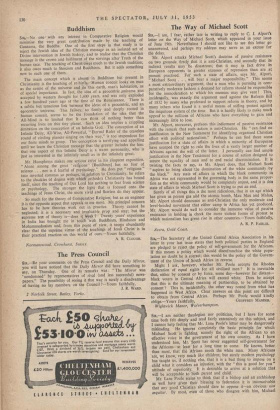The Way of Michael Scott
SIR,—! am, I fear, rather late in Writing to reply to C. J. Alport's letter on the Way of Michael Scott, which appeared in your issue of June 19th. Nevertheless I should not like to see this letter go unanswered, and perhaps my address may serve as an excuse for the delay.
Mr. Alport attacks Michael Scott's doctrine of passive resistance on two grounds: firstly that it is anti-Christian, and secondly that its indirect results may be disastrous; that it may in fact drive its European opponents to greater excesses of repression than are at present practised. For such a state of affairs, says Mr. Alport, "Michael Scott . . . will bear a major responsibility." This seems a most extraordinary argument; that a man who is pursuing in com- paratively moderate fashion a demand for reform should be responsible for the immoderation to which his enemies may give vent ! This, incidentally, was exactly the argument used against the Reform Bill of 1832 by many who professed to support reform in theory, and by many Others who found it a useful means of stiffing protest against the iniquitous system of the time. But it is hardly likely to make much appeal' to the millions of Africans who have everything to gain and increasingly little to lose.
Mr. Alport, moreover, prefaces this indictment of passive resistance with the remark that such action is anti-Christian. He "can find no justification in the New Testament for identifying organised Christian effort with political nationalism." Perhaps he can find there some justification for a state of affairs in which a minority of Europeans have usurped the right to rule the lives of a vastly larger number of Africans against the will of the latter. I personally can find ample justification in the New Testament for a course of action designed to secure the equality of man and to end racial discrimination. It is twisting the facts to say, as Mr. Alport does, that Michael Scott "aspires to bring about the domination of the white community by the black." Any state of affairs in which the black community in Africa was not represented in the governing body in the same propor- tion as the white community would be completely unjust, and it is this state of affairs to which Michael Scott is trying to put an end.
Surely of all things this is the most ridiculous, that in an age which has given us poison gas and the atomic bomb, Mau Mau and Malan, Mr. Alport should denounce as anti-Christian the only moderate and level-headed movement that either camp in Africa has yet produced. Mr. Alport would do well to consider the immense value of passive resistance in holding in check the more violent forms of protest to which nationalism has given rise in other countries.—Yours faithfully, Accra, Gold Coast. A. R. P. FAIRLIE.


































 Previous page
Previous page